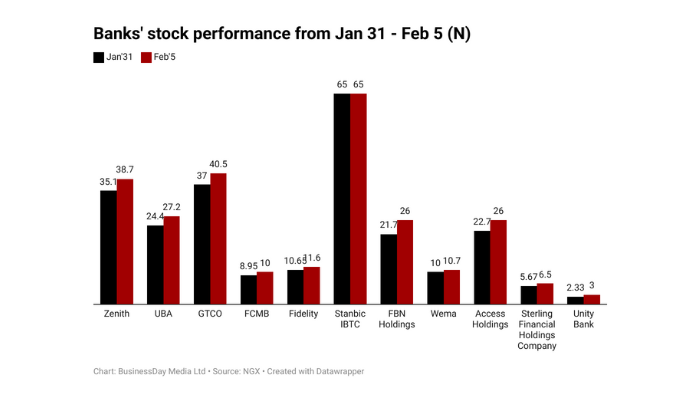Many banks’ stocks have not slowed their rally since the Central Bank of Nigeria (CBN) imposed stringent limits on their Net Open Position (NOP) regarding foreign currency exposures, both on and off the balance sheet.
Tracking Tier-1 and Tier-2 banks stocks performance shows they are not losing steam yet despite concerns that the new regulatory directive which became effective on February 1 could lead to intensified sell-offs across banking stocks.
“Given the established implications to the economy and particularly to the banks, we recommend that: Investors particular about capital gains should take profit on banking tickers in bid to reposition,” according to Meristem research analysts in a recent note.
According to them, “Long-term investors with objective to benefit from dividend payments should hold their positions. Also, investors that took long position at higher-than-current price can accumulate to lower their average cost.
“Interested and potential investors can consider taking long position on the banking tickers with attractive upside potential”.
Net Open Position is the difference between a bank’s foreign currency denominated assets and its foreign-currency denominated liabilities.
When a bank has higher FCY assets than FCY liabilities, it is said to be in a long position while it is in a short position when its FCY assets are less than its FCY liabilities. For banks in long position, a devaluation of Naira should typically result in FX revaluation gains and vice versa.
“Whilst banks would be able to keep their FX gains made thus far, this policy puts an end to future prospect for FX gains and may begin to reflect on the valuation of banks stocks going forward,” Abiola Rasaq, former economist and head investor relations for United Bank for Africa Plc told BusinessDay.
He said, “This policy brings an end to what some would refer to as ‘abnormal profit’ of banks arising from foreign exchange gains, as banks are going forward expected to either square out their foreign currency open position or have a short position, which would mean having more foreign currency liabilities than assets. Indeed, the allowance to have a 20percent short open position is an incentive for any bank which believes Naira is undervalued to raise foreign currency liabilities and step it down to Naira, with hope of making gains from such strategy when Naira appreciates in the future”.
Meristem research analysts further noted that “Banks (like UBA, FBNH, GTCO, and ZENITHBANK) that benefitted significantly in 2023 through robust FX revaluation gains are not expected to record the high gains in 2024.
“Thus, our 2024FY expected earnings per share for these banks are lower relative to 2023FY. We highlight the potential time constraint on banks to meet the imposed limit and adjust their foreign currency position”.
CardinalStone analysts said uncertainties over the implications of the guidelines led to intensified sell-offs across banking stocks, “with a few tickers closing on full offers at the end of the trading day”.
They however noted that banks expected full year (FY) 2023 numbers are likely to remain strong, “with the provisions of the circular unlikely to impact the reporting of the previous year’s results”.
Tracking the performance of bank shares shows Zenith Bank share price which closed at N35.1 per share as at January 31 rose to N38.7 as at February 5. Also, within the same period under review, the share price of UBA has risen from N24.4 to N27.2.
GTCO share price increased from N37 to N40.5. FCMB Group share price increased from N8.95 to N10. Fidelity Bank has rallied from N10.65 to N11.6. Stanbic IBTC Holdings stayed flat at N65 per share.
Despite this view, banking stocks have recorded impressive bargain-hunting activities particularly for those with strong fundamentals and impressive earnings releases as dividend scouting investors cherry-pick stocks ahead of full-year dividend declarations.
FBN Holdings has also moved from January 31 low of N21.7 to N26. Wema Bank moved from N10 to N10.7. Access Corporation share price increased from N22.7 as at January 31 to N26 as at February 5.
Sterling Financial Holdings Company share price moved up from N5.67 to N6.5; while that of Unity Bank increased from N2.33 to N3.
With 9.94percent return month-to-date (MtD), the NGX Banking Index as at Monday, February 5 outperformed other sectoral indices. The stock market’s positive return stood at 38.63 percent as at Monday.
“The rally in January 2024 has been predominantly driven by significant gains in just three stocks: Dangote Cement; BUA Cement; BUA Foods,” Guy Czartoryski-led team of Coronation research analysts noted. While answering question on whether January 2024’s 35.8percent return was truly representative of the market, and whether it was a good guide to most of the stocks in the market, the analysts said, “We think not”.

